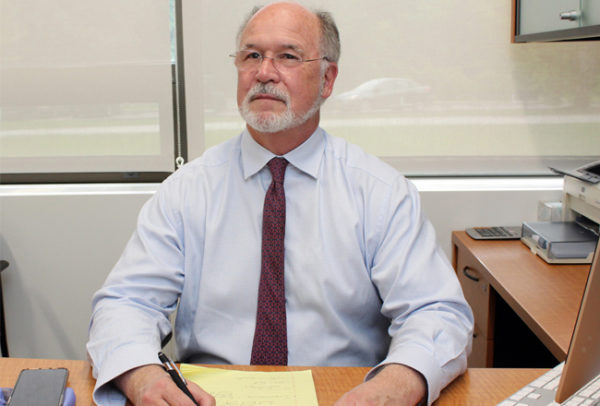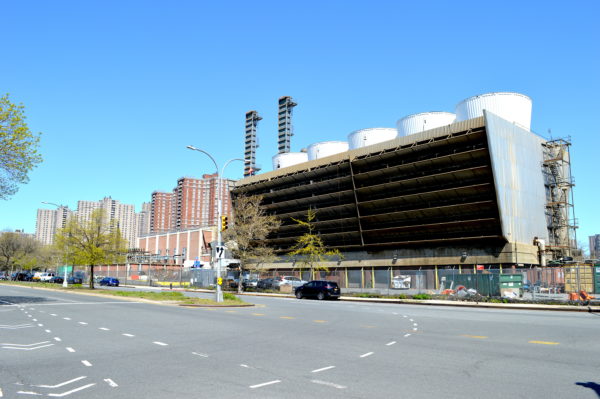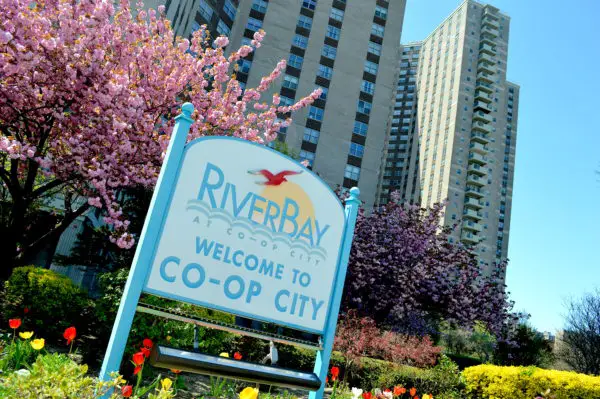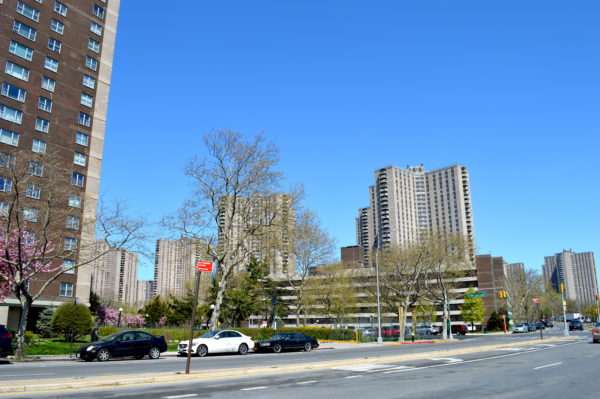Westchester attorney is instrumental in $621.5M refinancing
A Westchester attorney whose firm is based in Yonkers was instrumental in coordinating a real estate refinancing so significant that it was announced jointly on April 28 by New York Gov. Kathy Hochul, U.S. Senate Majority Leader Chuck Schumer, Congressman Jamal Bowman and U.S. Housing and Urban Development (HUD) Secretary Marcia Fudge.
Even without the fanfare from Albany and Washington, the dollar value of the deal was enough to make people sit up and take notice: $621.5 million. In addition, this was the second time the attorney shepherded putting in place a $621.5 million financing package for the property. Topping it off is that the refinancing makes it possible to spend $124 million on repairs and upgrades for an iconic residential property.

The property is Co-Op City in the Baychester section of the Bronx, and the attorney is Jeffrey Buss, founding member of the law firm Smith Buss & Jacobs LLP, which is based in Yonkers and also has offices in Manhattan and Garden City. Buss has for the past 16 years served as general counsel for Co-Op City”™s legal entity, Riverbay Corporation. Riverbay, or Co-Op City, has 15,372 residential units that are home to more than 45,000 people. Co-Op City is easily visible to drivers on the Hutchinson River Parkway and Interstate 95, as well as being so big it”™s an easy landmark for flights into and out of LaGuardia Airport.

There are 35 high-rise buildings and 472 townhouses on the property. The tallest buildings have 33 stories with 384 apartments. Eight garages provide 10,790 parking spaces and city buses provide regular service along the roadways that wind through the property.
Shoppers who reside in Co-Op City and come in from elsewhere take advantage of three separate large shopping centers that include numerous restaurants and the AMC Bay Plaza Cinema 13. Commercial offices are located on high-rise ground floors and a variety of recreational and community facilities are available along with a plethora of flowering trees, plantings and green lawns between the buildings.
Co-Op City opened on Dec. 11, 1968. The Riverbay Corporation was formed in accordance with Title II of the federal government”™s Private Housing Finance Law, also known as the Mitchell-Lama program, and was aimed at providing affordable housing for middle-income people. When it opened, almost all of the units had been presold. Today, there”™s a sizable waiting list to get in. Currently, a one-bedroom unit would cost $13,500 with a monthly maintenance of $579. A three-bedroom townhouse would be $31,500 with a monthly maintenance of $1,351.

“We did this exact same transaction nine years ago in 2012, and at that time it was the first co-operative refinancing that had taken place with HUD in this type of a loan and we had to develop and create a number of procedures and things that didn”™t previously exist,” Buss told the Business Journals. “At that time, we got New York state and New York City to also join in, guaranteeing a portion of the debt, and so I assumed, incorrectly, that refinancing what I thought was the same loan nine years later would be easier. It actually was just as challenging.”
Buss explained that under the financing arrangement, HUD guarantees or insures the payment by Riverbay of the mortgage held by Wells Fargo, but New York state and New York City join for a portion of that guarantee. Government National Mortgage Association (Ginnie Mae) bonds were issued. Between the bonds and the government”™s insurance, Riverbay gets a lower interest rate, basically 3%, for 35 years. It”™s a self-amortizing loan and at the end of 35 years would be completely paid.

Because of the self-amortizing feature of the loan from nine years ago, Riverbay built up $124 million it now is able to pull out and use for capital improvements including upgrades to heating and air conditioning, maintenance of electrical systems and improvements to facades.
“We brought in a third-party engineering firm and they did a complete evaluation of the property and we then negotiated with the bank Wells Fargo, HUD, New York state and used our own input to figure out what repairs needed to be done and then we put them on a schedule and that”™s what we can spend the money on,” Buss said.
Buss said this time they had a virtual closing compared with the first refinancing when all of the parties has representatives gathered in a room.
“With Covid, the practice of law has changed significantly. Between emails and Zoom and Webex conferences, lawyers can work from various locations very efficiently at the same time,” Buss said. “This was an extraordinarily complex undertaking with lots and lots of documents. Eventually we”™ll print it up and bind it in books. The one from 2012 is three binders, each of which is about eight inches thick, and some of the inclusions were computer discs that had a thousand pages on them.”
Buss said that, as part of getting everything ready to close on the new financing, they had to confirm the condition of the property and provide documentation showing that violations were either nonexistent or corrected or agreements were in place to have certain things done.

Buss said that there are 26 lawyers in his firm and they actually represent 424 co-op and condominium associations, which he believes is the largest number represented by one law firm in the state of New York.
“Co-Op City by itself is bigger than the other 423 put together and it presents a lot of challenges but is extraordinarily interesting,” Buss said. “It”™s akin to being corporation counsel for a town.”
Buss said that Co-Op City is a well-maintained property, but it is 50 years old, and like any house that is 50 years old it can need work.
“We don”™t receive federal or state subsidies,” Buss said. “Ninety-eight percent of our income is derived from shareholders who pay maintenance. Income comes from commercial tenants and also from our power plant where we not only generate all of our own electricity and heat and air conditioning but we sell surplus electricity to Con Ed. Last year we made $5 million doing that.”
The power plant can generate up to 40 megawatts of electricity, with a megawatt being one million watts, enough to light about 9,000 standard 100-watt bulbs on a 110-volt system. Two of the generators are powered by natural gas and a third is powered by steam that the plant generates. The Co-Op City power plant first serves the needs of the property, then feeds additional power via high voltage feeder cables directly to Con Ed”™s Parkchester Substation.
In announcing the Co-Op City refinancing, Gov. Hochul said, “This transformative injection of capital funding will allow us to modernize Co-Op City ”¦ and ensure long-term affordability for its 45,000 residents.”
Sen. Schumer said in the announcement that he had worked to push for the refinancing and believes Co-Op City will help provide affordable housing for generations to come.
“Co-Op City is a prime example of what cooperative housing can look like across this nation,” Rep. Bowman said.
HUD Secretary Fudge said in the announcement, “From supporting larger loans in major metropolitan areas to smaller loans in rural communities and suburbs, HUD is proud to be a partner in creating and preserving affordable housing across the country.”
Buss noted that Co-Op City”™s popularity continues unabated from where it was when it first opened. Although income qualification levels vary according to household size, families with incomes of up to $58,826 generally would qualify to purchase a one-bedroom unit while the maximum income for a three-bedroom unit would be $140,760.
“We have massive waiting lists for people to purchase and move in,” Buss said. “Townhouses have at the moment a six-year waiting list and two- and three-bedrooms have on average two-and-a-half to three-year waiting lists.”
He said that Riverbay has more than 1,000 employees and someone is available to make repairs or otherwise help residents around the clock. He said Co-Op City would be the 10th-largest municipality in the New York state if wasn”™t in New York City and that it even has its own police force with 107 armed public safety officers. He said Riverbay was among the first in New York state to mandate body-cams for its police force.
“We have the third-lowest crime rate in the Bronx,” Buss said. “The only places that have lower crime rates than us are the Bronx Botanical Gardens and the Bronx Zoo.”